This post may contain ads and affiliate links and we may earn a small commission when you click on the links at no additional cost to you. As an Amazon Affiliate, we earn from qualifying purchases. You can read our full disclaimer here.
Goldendoodle Separation Anxiety: Simple Solutions for a Calm Dog
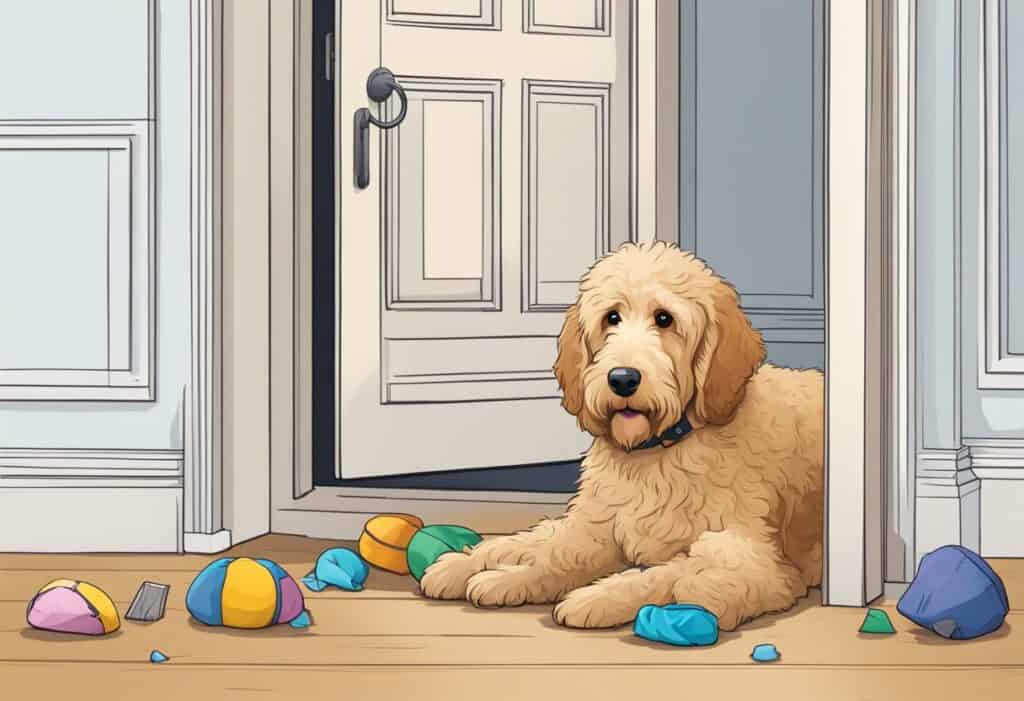
Dealing with Goldendoodle separation anxiety can be a challenge, but it’s one we’ve navigated with our dog, Gunner.
At 11 years old, Gunner has shown signs of separation anxiety, like shaking and barking, since he was younger. Thankfully, as he’s aged, we’ve seen improvement.
Having another dog, a Golden Retriever, around the house seems to provide him with some comfort and ease his anxiety.
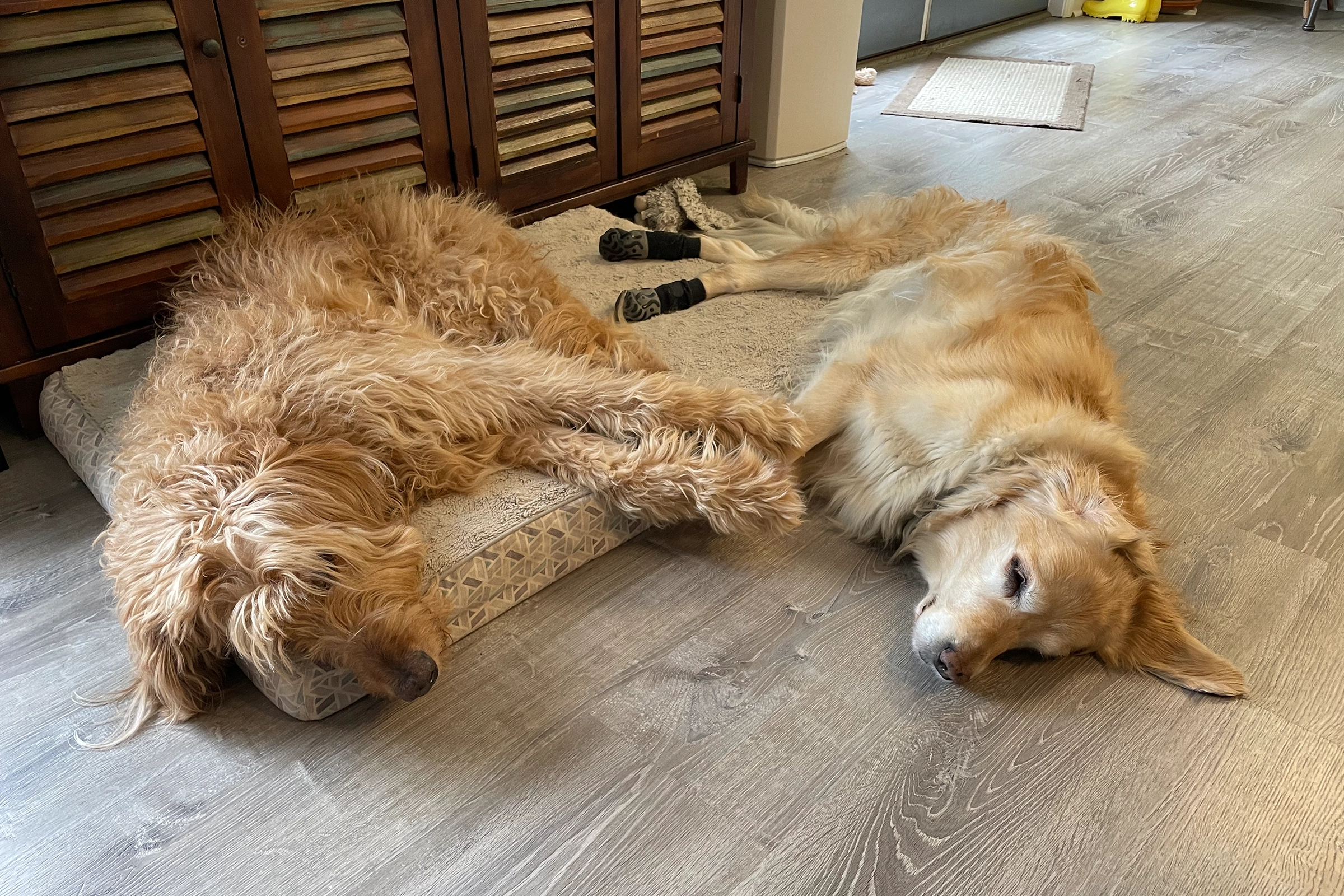
Goldendoodle Separation Anxiety
You may have noticed your Goldendoodle pacing around when you grab your keys or whining as you head toward the door.
If so, your Goldendoodle could be dealing with separation anxiety, a common issue faced by dogs, particularly in breeds as sociable and people-oriented as Goldendoodles.
These lovable mixes between Golden Retrievers and Poodles can find it tough to be alone, given their attachment to their humans.
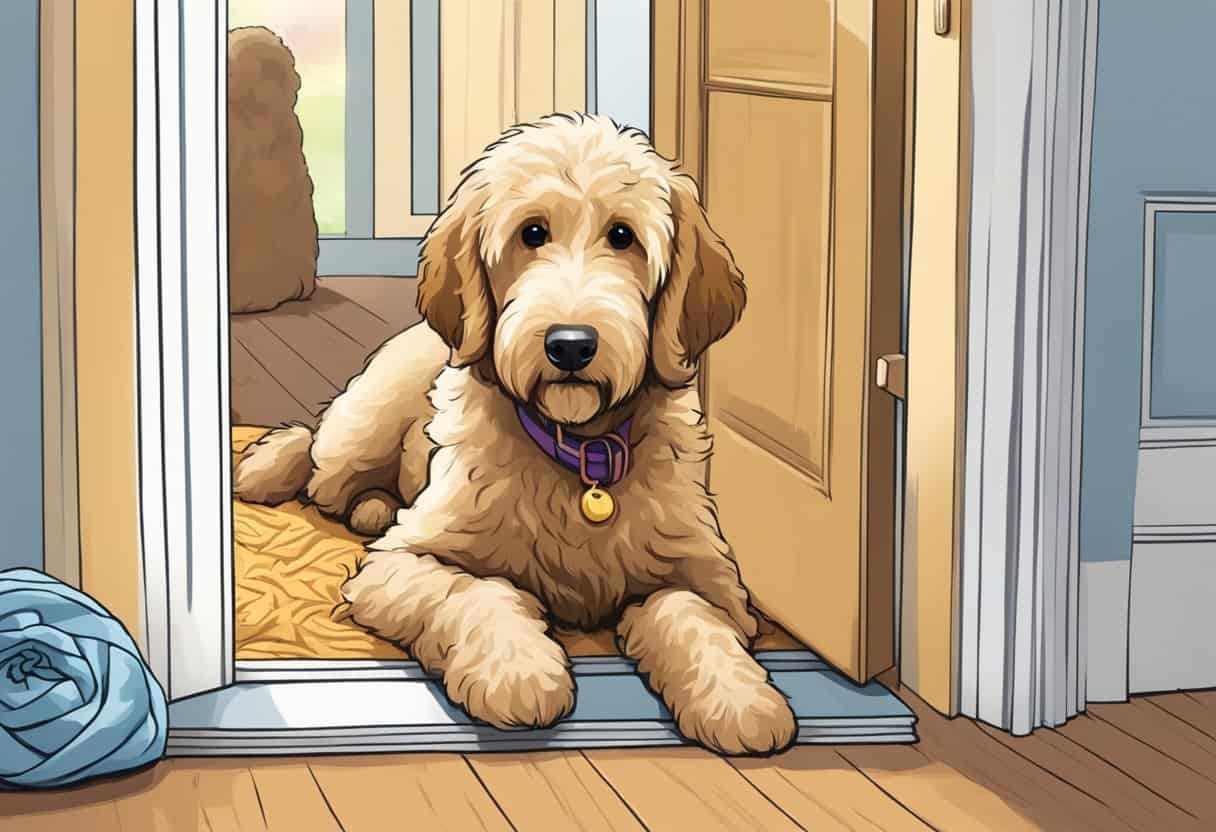
Understanding your dog’s distress when apart is vital in helping them overcome this challenge.
The breed’s intelligence and eagerness to please mean that with the right approach, a Goldendoodle’s separation anxiety can be managed.
Signs of anxiety include destructive behavior, excessive barking, and restlessness. It’s key not to punish your dog for this behavior, as it stems from fear and distress, not disobedience.
Helping your Goldendoodle cope with separation anxiety is about creating a calm, secure environment and may involve training routines that gradually acclimate them to your absence.
It’s about patience, consistency, and plenty of love.
Understanding Goldendoodle Separation Anxiety
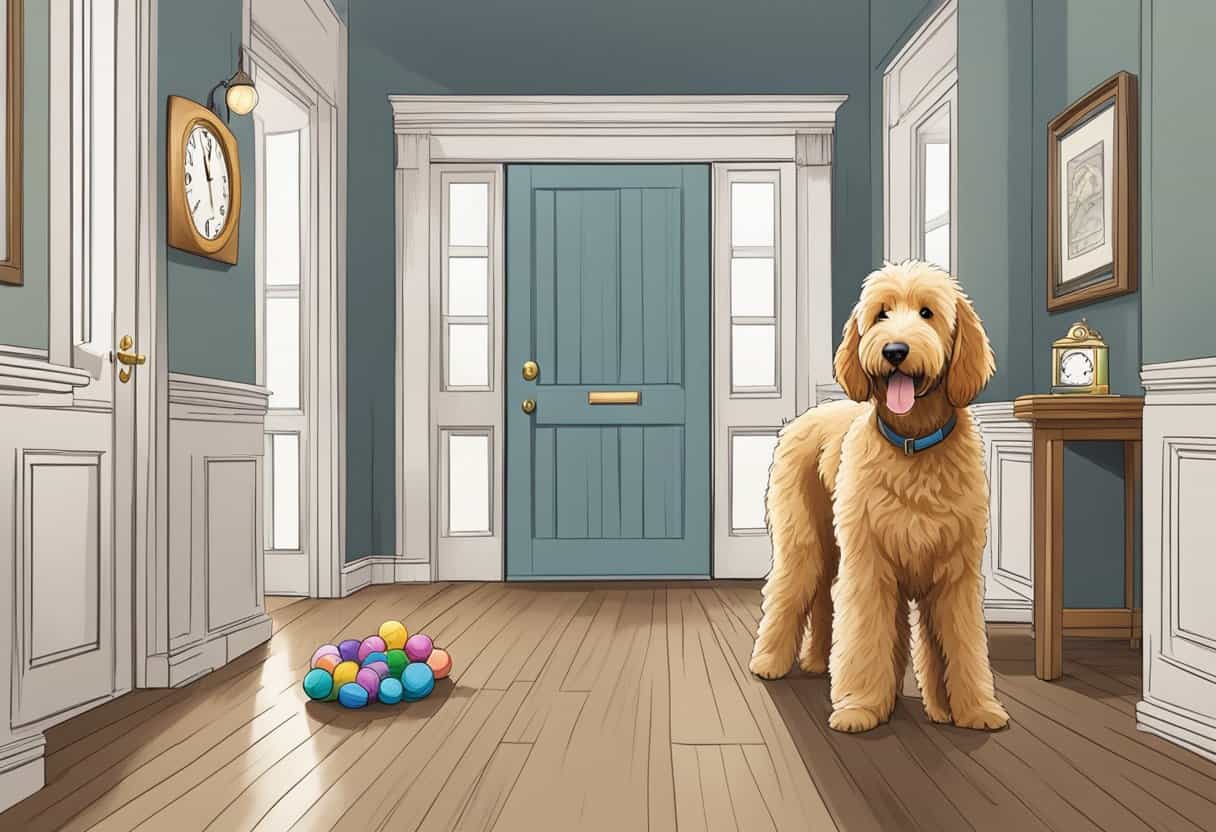
When your Goldendoodle shows signs of distress as you’re getting ready to leave the house, it’s possible they’re experiencing separation anxiety.
This anxiety can manifest through various symptoms, often observed as changes in their normal behavior.
Goldendoodle Separation Anxiety: Symptoms to Watch For
When it comes to understanding your Goldendoodle’s feelings, especially around separation anxiety, there are clear signs and symptoms to keep an eye out for.
Recognizing these early can make a world of difference in how you address and manage their anxiety.
Common Symptoms
Goldendoodles are expressive dogs, and when they start feeling anxious about being left alone, they’ll let you know in various ways. Here’s a breakdown of symptoms to watch for:
| Symptom | What to Look For |
|---|---|
| Destructive Behavior | Chewing on furniture, shoes, or other household items not typically of interest when you’re around. |
| Excessive Barking | Barking or howling more than usual, especially in a distressed tone when left alone. |
| Pacing | Walking or trotting back and forth along a specific path in a compulsive or repetitive manner. |
| Shaking | Showing signs of trembling or shaking that doesn’t seem related to the cold or excitement. |
| Escaping Attempts | Trying to escape from the house or crate, which could lead to injury or destructive behavior. |
| Accidents Indoors | Urinating or defecating inside the house despite being house-trained, particularly when left alone. |
Recognizing these signs is the first step toward helping your Goldendoodle cope with separation anxiety. Remember, these behaviors are your dog’s way of communicating discomfort and stress due to separation.
Observing and addressing these early on can help in managing their anxiety more effectively.
Experiencing these behaviors doesn’t automatically mean your doodle has severe separation anxiety, but it’s worth taking note. Picking up on these signs early can make addressing the issue more manageable.
If you’re unsure about your dog’s behavior, consulting with a vet or a professional dog trainer can offer insight and peace of mind.
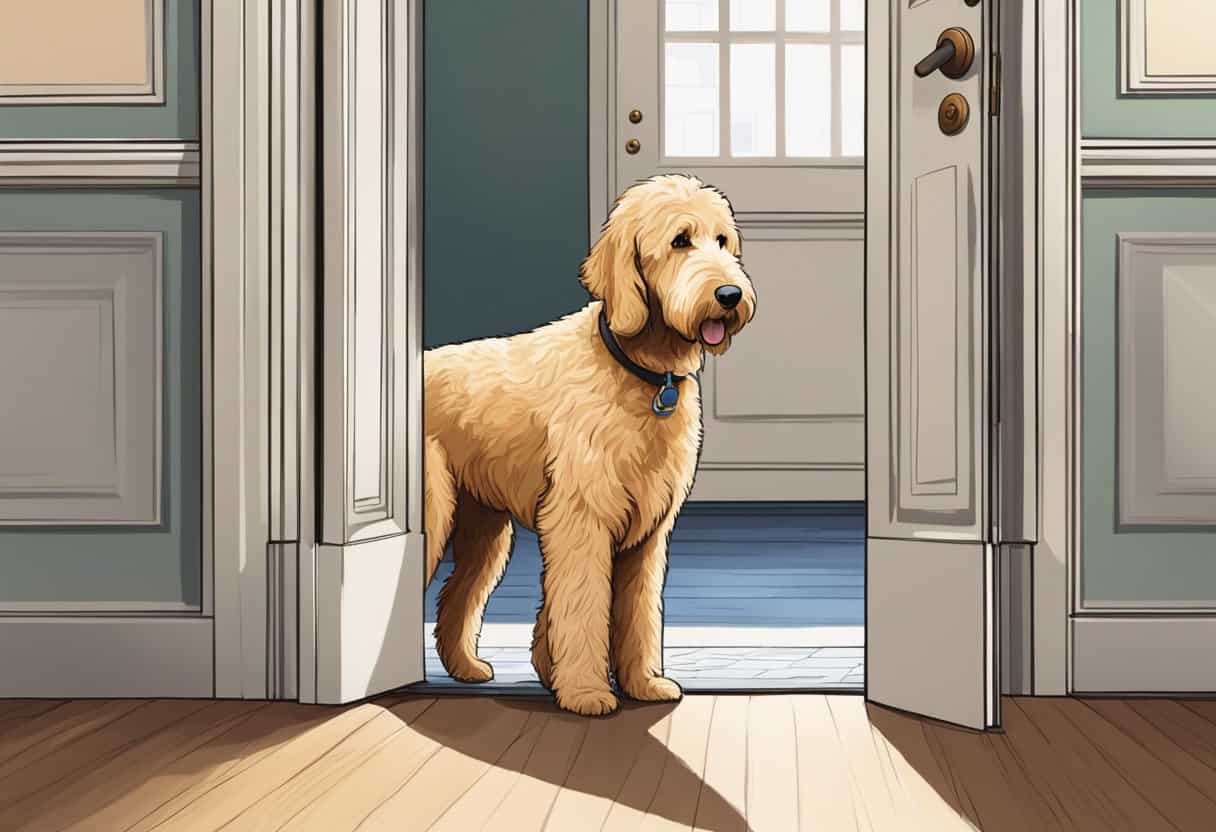
Preventative Measures and Management
Goldendoodles are social and loving pets, hence it’s crucial to stave off separation anxiety by incorporating preventative measures and effective management strategies.
Keep your buddy’s tail wagging even when you’re not around!
Establishing a Routine
Consistency is key for your Goldendoodle. A consistent routine helps reduce stress as your pooch knows what to expect.
Stick to regular feeding, walking, and bedtime schedules. Sudden changes in routine can unsettle your dog, so gently adjust timings if necessary.
Training and Positive Reinforcement
Engage in obedience training to instill confidence and promote good behavior.
Regular training sessions paired with positive reinforcement like treats and affection reinforce your bond.
Crate training can provide a safe space, but never use it as punishment.
Providing Mental and Physical Stimulation
Lack of activity can lead to anxiety.
Ensure daily exercise and playtime to burn off excess energy.
Introduce interactive toys and puzzles to keep your Goldendoodle’s brain sharp and engaged.
Consider brain training for dogs to enhance mental stimulation and deter boredom.
Understanding Causes and Triggers
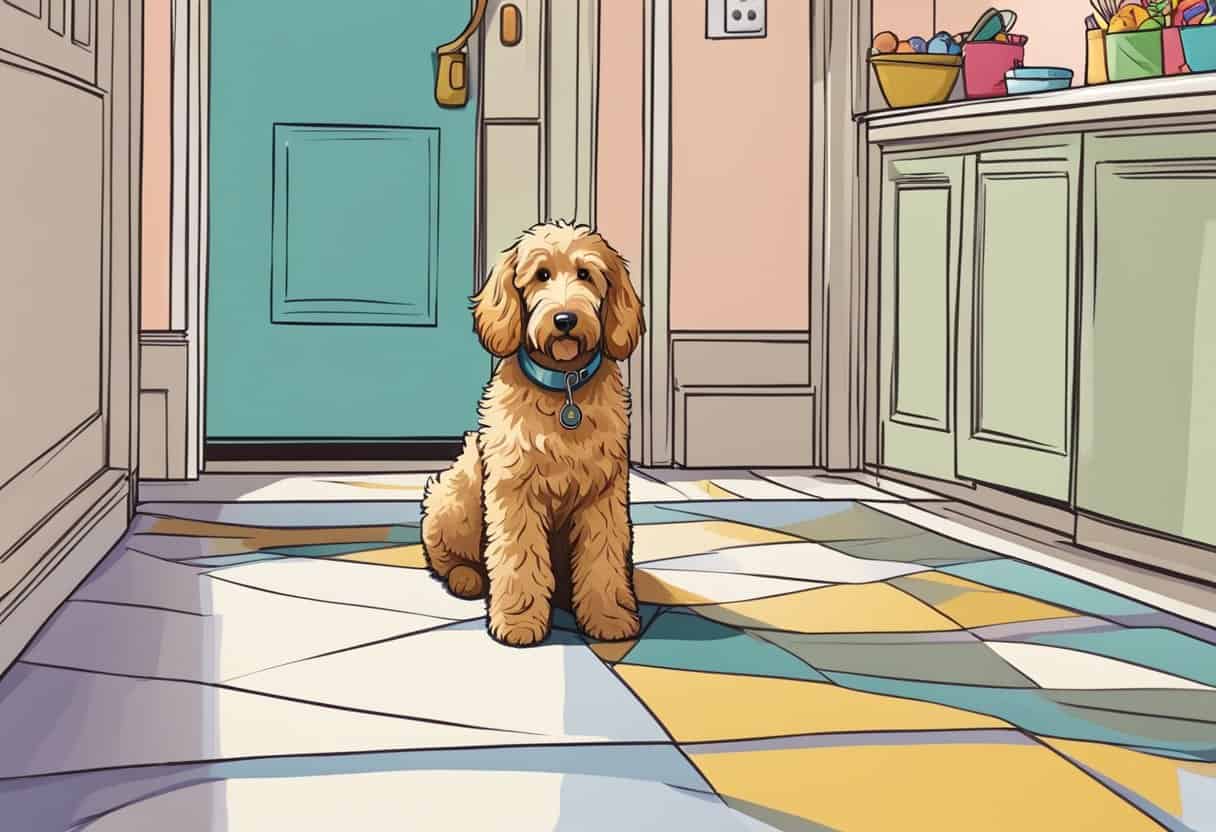
When you notice your Goldendoodle showing signs of separation anxiety, it can be puzzling. You might wonder, “Why does my happy-go-lucky fur friend go into panic mode the minute I leave?”
Let’s break down the reasons leading to this behavior.
- Causes: Your Goldendoodle’s separation anxiety might be stemming from a few key factors. Genetics play a role; some dogs are simply more prone to anxiety. Think of it like a family trait that gets passed down.
- Lifestyle & Routine Changes: Big changes in your dog’s life can also trigger stress. Maybe you’ve moved to a new place, switched to a different schedule, or there’s a new addition to your family. Such changes can throw your Goldie off their game.
- Lack of Socialization: Early experiences matter. If your Goldendoodle didn’t get to hang out with lots of people and other pups during their first few months, they might be more anxious about being alone now.
- Past Trauma: If you’ve adopted an older dog, it’s tough to know what they’ve been through. A history of abandonment or frequent rehoming can definitely contribute to those anxious vibes when you’re out.
Understanding the triggers can help you better support your Goldendoodle. With patience and consistent care, you can help ease their anxiety and build up their confidence for times when they have to be on their own.
Effective Solutions for Goldendoodles
When it comes to easing separation anxiety in your Goldendoodle, a mix of training, home adjustments, professional support, and socialization can be super effective.
Picking the right strategies can make a world of difference for both you and your furry pal.
Behavioral Training and Support
Start with behavioral training which can help your Goldendoodle learn to handle being alone.
Obedience training is key, teaching commands like ‘stay’ and ‘sit’ that calm and settle your dog.
Gradually increasing the time your dog spends alone can also mitigate anxiety, as it learns that solitude is safe and temporary.
- Teach basic commands to establish a routine.
- Practice controlled separations, gradually increasing alone time.
Home and Environmental Adjustments for Your Goldendoodle
Ensuring your home feels like a safe and comforting space for your Goldendoodle is crucial, especially when dealing with separation anxiety.
Making a few simple adjustments around your house can significantly impact their well-being and help ease their stress. Here’s how to create a supportive environment:
Cozy Spaces
Designate a specific area in your home where your Goldendoodle can feel secure and relaxed. Equip this spot with soft, comfortable bedding where they can snuggle up.
This area should be a peaceful retreat where they can go to feel safe.
Familiar Comforts
In their cozy spot, include familiar items like their favorite blankets and toys. These items carry your scent and can provide a sense of comfort and security to your dog when you’re not around.
Engaging Toys
Toys are more than just playthings; they’re tools that can help manage anxiety. Offer a variety of toys, particularly those that encourage interaction and mental engagement. Puzzle toys that dispense treats are excellent for keeping their mind occupied and can significantly reduce feelings of stress and boredom.
Mental Stimulation
Interactive toys, like those that mimic hunting behaviors or require problem-solving, are fantastic for mental stimulation. Engaging their brain in such activities can tire them out in a good way, making them more relaxed and less prone to anxiety.
Safe Spaces
Consider creating multiple safe spaces around your home. Each space can have a different set of toys and comforts, providing variety and ensuring your Goldendoodle has a sanctuary no matter where they are in the house.
Consistent Environment
Try to keep your home environment as consistent as possible. Sudden changes in the household can add to their stress, so maintaining a calm and stable environment is key.
By making these adjustments, you’re not only creating a more enjoyable living space for your Goldendoodle but also actively contributing to their emotional and psychological well-being.
Remember, the goal is to make them feel secure and loved, even when you’re not physically there with them.
Professional Therapy and Medication for Goldendoodle Separation Anxiety
In cases where Goldendoodle separation anxiety is particularly challenging, professional intervention may be necessary. Here are five key approaches to consider:
- Consult a Veterinarian: A professional can assess the severity of your dog’s anxiety and recommend appropriate behavior modification programs or medication to help manage the symptoms.
- Behavior Modification Programs: Tailored programs can teach your dog to cope with anxiety in a healthy way, often involving gradual exposure to being alone while ensuring they feel safe.
- Medication Options: For severe anxiety, a vet might prescribe medication that can help calm your dog’s nerves, making the training process more effective.
- Music Therapy: Playing calming music or sounds designed specifically for dogs can create a soothing atmosphere that may help ease your Goldendoodle’s anxiety.
- Professional Dog Trainer: A trainer experienced in dealing with separation anxiety can offer personalized strategies and support to help your dog become more independent.
Remember, each dog is unique, so what works for one may not work for another. It’s important to explore these options under the guidance of professionals to find the best solution for your Goldendoodle.
Socialization and Doggy Daycare for Goldendoodle Separation Anxiety
Goldendoodles thrive on companionship and interaction, making socialization and doggy daycare excellent strategies to combat separation anxiety.
Here are five actionable steps to consider:
- Prioritize Socialization: Introduce your Goldendoodle to new dogs and people regularly to build their confidence and ease around others.
- Enroll in Doggy Daycare: Choose a reputable daycare facility where your Goldendoodle can engage in play and form friendships, providing them with the companionship they crave.
- Arrange Play Dates: Set up regular play sessions with other dogs. This not only helps in socialization but also ensures they’re tired and content, reducing anxiety.
- Participate in Group Walks: Join local dog walking groups to allow your Goldendoodle to interact with different dogs and environments, enhancing their social skills.
- Choose the Right Facility: When selecting a daycare, ensure it offers a safe and stimulating environment that caters to your dog’s needs and personality.
Incorporating these steps into your Goldendoodle’s routine can significantly improve their quality of life and mitigate the effects of separation anxiety by fulfilling their need for interaction and activity.
Coping Strategies for Pet Owners
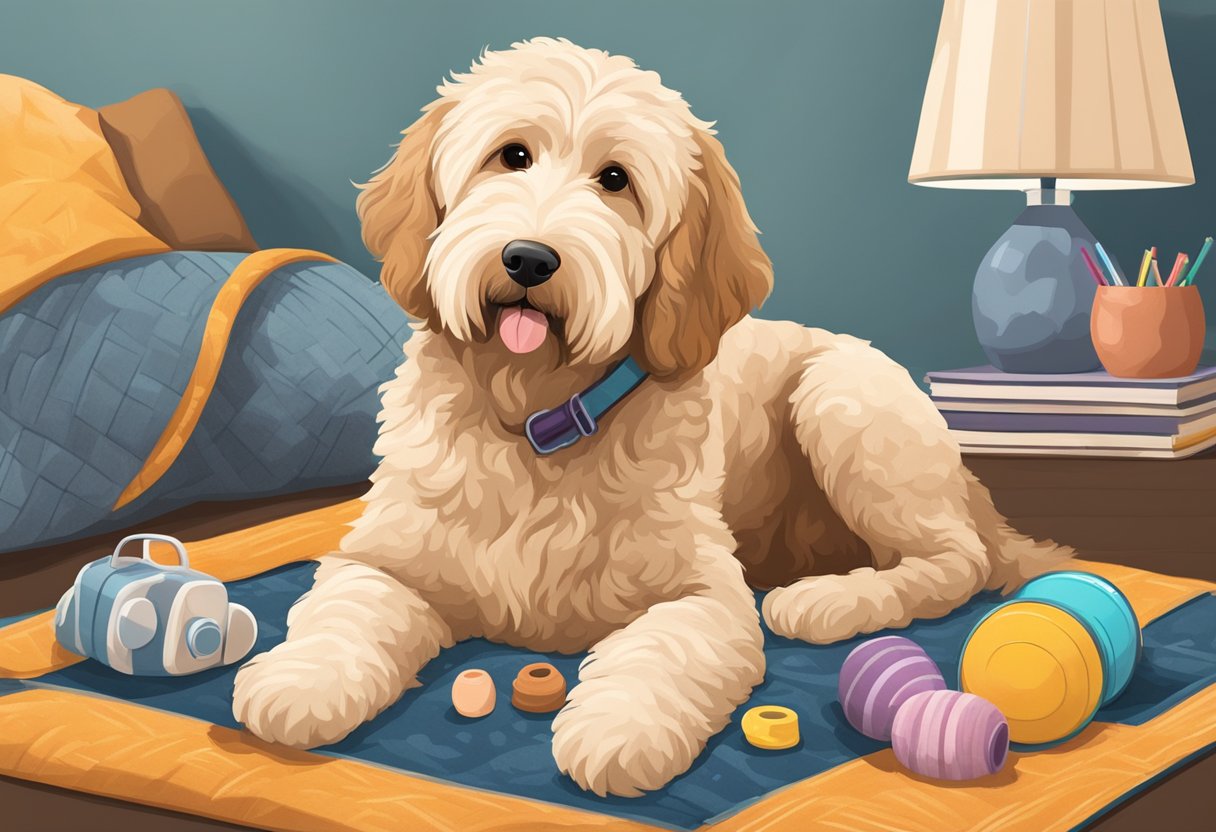
If you’re a pet owner with a Goldendoodle who’s got separation anxiety, your furry friend probably hates it when you leave. Don’t sweat it though, there are ways to make your goodbyes less stressful for both of you.
Create a goodbye ritual. Keep it simple. A special treat or a warm, calm pat can signal that it’s okay for you to step out. Repeating this can help your doodle learn that you leaving isn’t the end of the world.
Consistency is key. Dogs thrive on routine. Feeding, walks, playtime—if you do these at regular times, your dog’s anxiety might ease up because they’ll know what to expect.
| Activity | Tip |
|---|---|
| Leaving the House | Use a calm voice and the same words. |
| Coming Home | Stay low-key to avoid a hyper fuss. |
Sprinkle in some positive reinforcement. Celebrate the small victories! If your Goldendoodle remains calm while you’re away, reward them when you get back. Treats, praises, or a bit of extra playtime work wonders.
Invest in a companion. Sometimes, getting another pet might help. If your schedule allows it and you have the space, another furry pal could keep your doodle company and cut down on the loneliness.
Goldendoodle Breed Traits and Temperament
Understanding your Goldendoodle’s breed characteristics and temperament can be crucial in addressing their needs and preventing separation anxiety.
These dogs are typically friendly, intelligent, and thrive on companionship.
Characteristics of the Goldendoodle
Goldendoodles are known for being both friendly and energetic. Their unique personalities reflect a mix of the traits commonly associated with their parent breeds—the Golden Retriever and the Poodle.
- Friendly: This furball loves being around people and is a hit at family gatherings.
- Energetic: A Goldendoodle has a big zest for life and enjoys staying active.
- Loving: Often forming strong bonds, they’re all about the cuddles and affection.
- Intelligent: Figuring out puzzles or learning commands is what they do best.
Genetic Influence
The temperament of a Goldendoodle can draw from the characteristics of both parent breeds. Here’s how it breaks down:
- Poodle: Highly intelligent and active, poodles contribute to the smarts and energy levels of the Goldendoodle.
- Golden Retriever: Their trademark loving nature and friendliness are traits often passed down.
Understanding genetics can help you anticipate some of the personality traits your Goldendoodle may exhibit.
Ideal Lifestyle and Social Needs
Goldendoodles fit best with a lifestyle that can provide:
- Daily Exercise: To channel their energy.
- Mental Stimulation: Such as games and training, to keep their intelligent minds engaged.
- Social Interaction: Regular playdates or time with family to satisfy their social appetite.
These dogs are happiest when they feel like part of the family, sharing in daily activities and receiving plenty of companionship.
FAQs About Goldendoodle Separation Anxiety
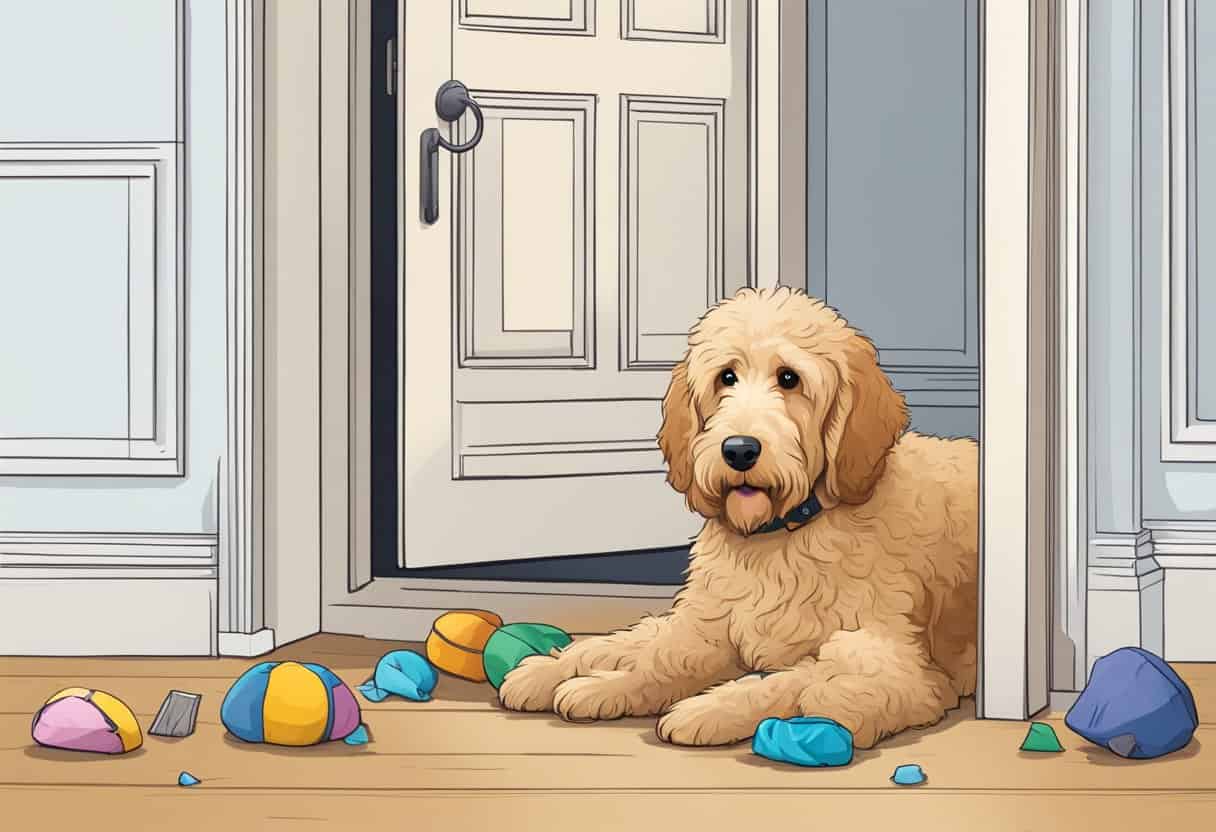
Wrapping Up Goldendoodle Separation Anxiety
Goldendoodle separation anxiety can be a challenge, but remember, addressing it is crucial for your furry friend’s well-being.
Your dog relies on you to be their anchor. With patience and consistency, you can help them overcome their anxiety.
10 Quick Tips to Tackle the Tailspins: Easing Your Goldendoodle’s Separation Woes
- Routine Rules: Establish a consistent daily schedule for feeding, walks, and playtime to create a sense of security.
- Farewell Fuss: Keep departures and arrivals low-key to avoid increasing their anxiety.
- Safe Space: Set up a cozy area with their favorite bed, toys, and a piece of your clothing to comfort them.
- Puzzle Toys: Engage their brain with treat-dispensing toys or puzzles to keep them occupied when alone.
- Background Noise: Leave the radio or TV on for background noise to mimic the presence of people.
- Exercise: A tired dog is a happy dog. Ensure plenty of physical activity to tire them out before you leave.
- Practice Time Apart: Gradually increase the time spent away to help them get used to being alone.
- Socialization: Regularly arrange playdates with other dogs to boost their confidence and distract them from your absence.
- Consider Daycare: Doggy daycare can be a great option for social interaction and reducing loneliness.
- Professional Help: If anxiety persists, consult a vet or animal behaviorist for tailored advice and possible medication options.
These tips aim to promote a more relaxed, anxiety-free environment for your Goldendoodle.
Strategies to Keep in Mind:
- Create a safe space in your home where your Goldendoodle can feel secure.
- Gradually increase time away from your dog to help them adjust.
- Utilize puzzle toys to keep their mind active and engaged when alone.
Explore professional help if necessary, such as a dog trainer or behaviorist. They can provide targeted strategies for your Goldendoodle.
Remember the importance of nurturing your Goldendoodle’s happiness through connection, play, and a stable environment.
Small steps can make a big difference in managing separation anxiety. Stay positive, and you’ll likely notice progress in your companion’s confidence and independence.
-

Coffee Mug – In Dog Coffees I’ve Only Had One
$11.95 – $14.95 Select options This product has multiple variants. The options may be chosen on the product page
